- Home
- Don’t wait until it’s too late: why regular health checks/ body check are crucial for your well-being
Don’t wait until it’s too late: why regular health checks/ body check are crucial for your well-being

- The importance of early detection: Regular health checks/ body check can help catch health problems early, when they’re easier to treat and manage. This can improve your chances of a full recovery and reduce the risk of complications.
- Understanding your health risks: Depending on your age, gender, family history, and lifestyle habits, you may be at increased risk for certain health conditions. Regular health checks/ body check can help you understand your risk factors and take steps to reduce them.
- Maintaining a baseline of health: When you have regular check-ups, your doctor can monitor changes in your health over time. This can help establish a baseline of your normal health, making it easier to detect abnormalities or changes that may be cause for concern.
- Staying up to date on preventive care: Some health checks/ body check , such as vaccinations or cancer screenings, are important for preventing disease altogether. By staying up to date on recommended preventive care, you can lower your risk of serious health problems.
- Building a relationship with your healthcare provider: Regular health checks/ body check give you the opportunity to build a relationship with your doctor or other healthcare provider. This can help them understand your unique health needs and provide personalized care and advice.
- Taking control of your health: By prioritizing regular health checks/ body check , you’re taking an active role in your own health and well-being. You’re also setting a good example for others in your life, showing that you value your health and are committed to taking care of yourself.
- Overcoming common barriers: Some people may be hesitant to get regular health checks/ body check for various reasons, such as cost, fear, or a lack of time. However, there are ways to overcome these barriers and make preventive care a priority.
- Types of health checks/ body check to consider: Depending on your age, gender, and health status, there are various types of health checks/ body check you may want to consider. These can include blood tests, physical exams, cancer screenings, and more.
- Making a plan for regular check-ups: To make sure you’re getting the preventive care you need, it can be helpful to make a plan for scheduling and tracking your health checks / body check. This can help you stay on top of your health and make it a regular part of your routine.
- Closing thoughts: By taking the time to prioritize regular health checks / body check, you’re investing in your future health and well-being. Whether you’re young or old, healthy or dealing with health challenges, there are always steps you can take to improve your health and reduce your risk of disease.

